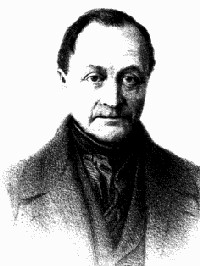| Profile | Major Works | Resources |
Auguste Comte, 1798-1857

French mathematician, philosopher and social scientist, often regarded as the founding father of sociology and "positivism"
Born in Montpellier (southern France) to a conservative family of crypto-royalists in the waning years of the first republic. In 1814, Auguste Comte enrolled at the prestigious École Polytechnique in Paris, but left when the Ecole was shut down by the Bourbon authorities in 1816. Comte remained in Paris, eking out a living as a mathematics tutor and occasional journalist. Shortly after, Comte met Henri de Saint-Simon, and soon became his secretary and disciple. After a close collaboration for several years, Comte finally broke with Saint-Simon in 1824 in a quarrel over publication rights. He returned to the margins of Parisian intelligentsia, again making a living as a private tutor and minor journalist. It was during this time that he developed the more definitive aspects of his "positive philosophy", professing to systematically organize and summarize all of natural and social sciences around a single empiricist principle.
In August 1826, August Comte launched a public lecture series on his "positivist philosophy". Not having a scholastic chair, it was privately organized and held for the public who paid a subscription in advance. Comte's name as a journalist was not unknown, and several Parisian notables (such as the economist Charles Dunoyer) enrolled out of curiosity. The course went poorly - Comte had a mental breakdown after the third lecture and was unable to continue. After a period in a sanatorium, Comte retired to his family in Montpellier for about a year. In 1829, Comte returned to Paris and resumed the lecture series. It went only a little better than the first. Although he attracted a small but loyal audience, his pretensions were mocked by professional academics and wider interest seemed to fall away.
Comte began writing his Cours in 1830, a task which would take over a decade to complete. In the meantime, he continued to make do with erratic sources of income - e.g. as an occasional schoolteacher, an assistant lecturer and examiner at the Ecole, etc. But his books soon gathered admirers - notably John Stuart Mill, who reviewed and lauded Comte as a first-rate thinker, and helped popularize his work. Harriet Martineau translated it into English, opening a new and admiring audience.
In 1843, with the Cours complete, Comte was finally seeming to obtain some of the recognition he craved, but things quickly turned erratic again. Dismissed from his minor posts at the Ecole Polytechnique, Comte went on a journalistic rampage against the academic establishment. Then, in a stranger turn, Comte (who had recently been abandoned by his wife) fell in love with a certain Clothilde de Vaux. It was not reciprocated and she died of consumption a couple of years later. Comte was heartbroken, but the experience seemed to have transformed Comte from a cold rationalist to a bubbling romantic. In the 1850s, he began putting out his Système. It had started out a systematic summary of his positivist philosophy, but under his new mindset, elevated emotion above rationality, and articulated a strange project for founding a new religion, a "Religion of Humanity", founded on universal love. Comte's emotional and mystical turn alienated Mill and other scientific followers, but Comte did not seem to care. In 1848, only days after the revolution, Comte had founded the Société Positiviste, a club for his new modernist religion, and set on a mission to proselytize among other audiences (he would henceforth refer to himself as the "Great Priest of Humanity") with a stream of lectures, pamphlets and publications. It became surprisingly quite popular and Comte's followers established chapters throughout France and overseas. The Positivist Society's motto ("Order and Progress") even found its way to be stitched on to the flag of the Republic of Brazil in 1889.
Comte was dismissive of economics, seeing it as a subsidiary branch of his wider "sociology". According to Comte, society should be analyzed as "organisms" with their own linear progress (through religious, metaphysical and scientific stages). The "positivist" or "empirical" method of sociological analysis could (only) be applied to this final, scientific stage. He disputed the economists' penchant for distinguishing between the economic and other aspects of social life. Instead, Comte envisaged "sociology" as the umbrella under which all the social sciences -- including economics -- would be subsumed, thus enabling their integration. This was a view that was, in fact, shared by several members of the German Historical School, the English and French historical schools and American Institutionalism, who would cite Comte against the attempt of Classical and later Neoclassical economics to posit economic behavior and decision-making as a universal constant, outside of historical and social context.
|
Major Works of Auguste Comte
|
|
HET
|
|
Resources on Auguste Comte
|
All rights reserved, Gonçalo L. Fonseca
